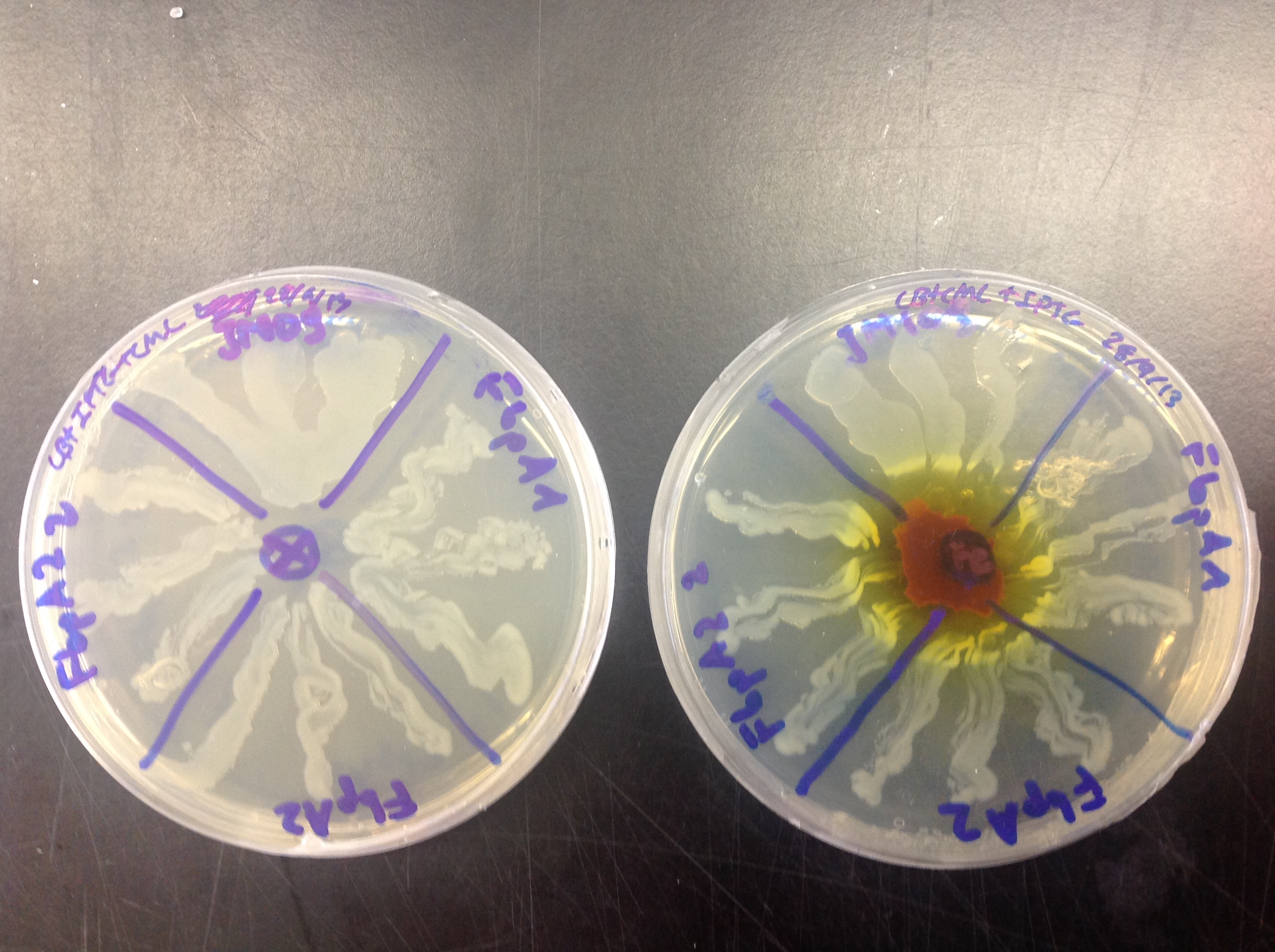Difference between revisions of "Part:BBa K1122703"
| Line 1: | Line 1: | ||
| − | |||
__NOTOC__ | __NOTOC__ | ||
<partinfo>BBa_K1122703 short</partinfo> | <partinfo>BBa_K1122703 short</partinfo> | ||
| Line 5: | Line 4: | ||
This part encodes a protein capable of binding a ferric ion. The periplasmic signal peptide has been deleted in order to achieve cytoplasmic localisation of the protein. | This part encodes a protein capable of binding a ferric ion. The periplasmic signal peptide has been deleted in order to achieve cytoplasmic localisation of the protein. | ||
| − | + | ||
===Usage and Biology=== | ===Usage and Biology=== | ||
| − | + | FbpA was expressed using Plac promoter. Overexpression of FbpA in high iron concentration (Figure 1) gave twofold results: | |
| + | |||
| + | -Overexpression of FbpA increases tolerance of ''E. coli'' to iron. As it can be observed on Figure 1 the cells producing the protein can grow closer to the iron source than those that do not (JM109). | ||
| + | |||
| + | -Upon closer inspection one can observe that cells overexpressing FbpA have slight red pigmentation. This could indicate that cells accumulate iron. | ||
| + | |||
| + | |||
| + | [[File:fbpa_functionality.jpg|600px]] | ||
| + | |||
| + | '''Figure 1.''' Ferric citrate was placed on the middle of the right plate. Control cells plated on no additional iron conditions (left), cells overexpressing FbpA (plate parts lebelled FbpA1, FbpA2 and FbpA22) in high iron conditions (right). Control cells without FbpA are labelled JM109. | ||
| + | |||
<span class='h3bb'>Sequence and Features</span> | <span class='h3bb'>Sequence and Features</span> | ||
<partinfo>BBa_K1122703 SequenceAndFeatures</partinfo> | <partinfo>BBa_K1122703 SequenceAndFeatures</partinfo> | ||
Latest revision as of 23:03, 4 October 2013
Ferric ion-binding protein (FbpA) without a signal peptide
This part encodes a protein capable of binding a ferric ion. The periplasmic signal peptide has been deleted in order to achieve cytoplasmic localisation of the protein.
Usage and Biology
FbpA was expressed using Plac promoter. Overexpression of FbpA in high iron concentration (Figure 1) gave twofold results:
-Overexpression of FbpA increases tolerance of E. coli to iron. As it can be observed on Figure 1 the cells producing the protein can grow closer to the iron source than those that do not (JM109).
-Upon closer inspection one can observe that cells overexpressing FbpA have slight red pigmentation. This could indicate that cells accumulate iron.
Figure 1. Ferric citrate was placed on the middle of the right plate. Control cells plated on no additional iron conditions (left), cells overexpressing FbpA (plate parts lebelled FbpA1, FbpA2 and FbpA22) in high iron conditions (right). Control cells without FbpA are labelled JM109.
Sequence and Features
- 10COMPATIBLE WITH RFC[10]
- 12INCOMPATIBLE WITH RFC[12]Illegal NotI site found at 469
- 21COMPATIBLE WITH RFC[21]
- 23COMPATIBLE WITH RFC[23]
- 25INCOMPATIBLE WITH RFC[25]Illegal NgoMIV site found at 118
Illegal NgoMIV site found at 751 - 1000COMPATIBLE WITH RFC[1000]

